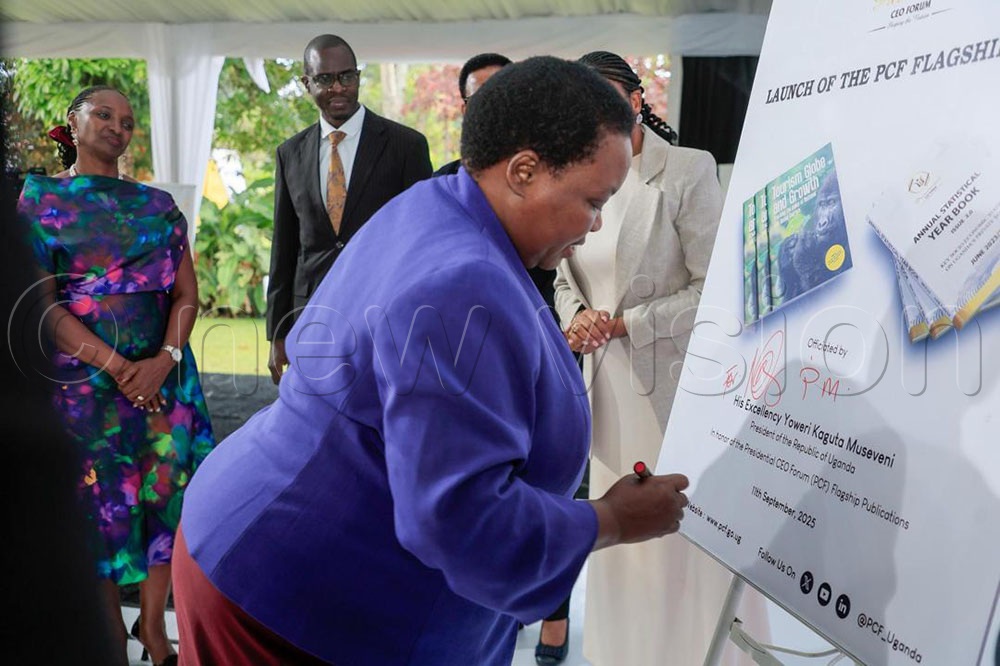Execution, infrastructure and creativity take centre stage as Uganda tourism sector charts next phase
Delegates also emphasised the development of a Lake Victoria tourism circuit with reliable utilities, a streamlined tax system, and a coordinated media strategy to counter negative global travel advisories.
Conservationists raised alarms over dwindling lion populations, warning that the decline of the big cats, especially lions, could damage the destination’s reputation as the Iconic symbol of Africa.
The stakes are high as Destination Uganda enters a decisive phase in positioning the tourism industry not merely as leisure but as a pillar for diplomacy, trade and investment.
Government and private sector leaders are pressing for urgent reforms to unlock its full potential under the Fourth National Development Plan (NDP IV).
This was apparent at the 6th Bi-Annual Private Sector CEO Retreat (September 9-11, 2025) in Fort Portal city, where Prime Minister Robinah Nabbanja pledged to deliver six key resolutions from industry leaders directly to President Yoweri Museveni.
Her promise electrified the gathering, where delegates convened to shape the future of a sector that has the potential to generate trillions in earnings but continues to wrestle with structural challenges.
“There have been delays in rehabilitating the Mubende–Kyenjojo road after the initial contractor diverted funds to clear debts. However, rest assured that the Government has intervened with an additional shillings 50 billion to accelerate the works. There are also aviation-related plans to improve connectivity. There are feasibility studies for Kabale–Nyamitanga airfield, a partner’s commitment to transform Mbarara into an international airport, and a Chinese investor’s interest in upgrading Kasese Airport,” Nabbanja said.
Adding that, she would deliver the resolutions from the retreat to the President after the next Cabinet meeting.
Tourism Minister Tom Butime struck a reflective note, describing the Fort Portal retreat as a “crucial platform for reflection” and emphasising the importance of translating commitments into results.
He pointed to encouraging growth: A 7.7 per cent rise in arrivals in 2024, more than 810,000 jobs created and record levels of domestic tourism.
“Peace, infrastructure investments, and community participation are contributing to these gains. However, more must be done. There is a need to expand the infrastructure, rolling out digital systems, investing in skills training, and diversifying products, which remain at the core of NDP IV priorities. If pursued with urgency, Uganda could aim for $50 billion in tourism earnings by 2040,” Butime said.
The permanent secretary testified to the recovery of both domestic and foreign arrivals since the COVID-19 lockdown.
Why President Museveni should be lead tourist
While government leaders painted a verbal picture of progress, private players voiced frank concerns. Veteran tour operator Boniface Byamukama suggested that President Museveni should frequent touring national parks, not only to market Uganda to international visitors but also to counter the negative perception created by global travel advisories.
He also called for harmonisation of the 26 taxes burdening the industry and pressed for faster airport upgrades.
Business magnate Dr Sudhir Ruparelia stressed the need for better co-ordination as Uganda positions itself as a meetings, incentives, conferences, and exhibitions (MICE) destination.
“Visitors need fast and reliable domestic transport - whether by air, water, or self-drive. Uganda could draw lessons from destinations like France and South Africa. Most importantly, we ought to learn to tell our own story. When the country marked 50 years since Idi Amin expelled Asians, the commemoration drew crowds from across the globe.
The private sector now seeks support to sustain and grow such products, because they enhance visibility, improve infrastructure, and create ripple effects across the economy,” Ruparelia said.
Lion population concerns
Conservationists raised alarms over dwindling lion populations, warning that the decline of the big cats, especially lions, could damage the destination’s reputation as the Iconic symbol of Africa. They called for stronger wildlife protection measures and proposed establishing a tourism school in Fort Portal to serve the surrounding protected areas.
From the creative industry, filmmaker and actor Mathew Nabwiiso renewed calls for a national creative economy policy, regional hubs, and a dedicated content fund. Without such interventions, he cautioned, Uganda risked lagging in a global creative economy that increasingly shapes tourism narratives and influences travellers’ choices.

Six resolutions
As the retreat drew to a close, CEOs, led by forum chairperson Emmanuel Katongole, unveiled six urgent resolutions.
These included rehabilitation of key tourism roads and construction of safe stopovers, expansion of air connectivity with special attention to Kisoro and Kasese, and a clear division of responsibilities between Uganda Airlines and private operators - leaving domestic routes to the latter while the national carrier focuses on international markets.
Delegates also emphasised the development of a Lake Victoria tourism circuit with reliable utilities, a streamlined tax system, and a coordinated media strategy to counter negative global travel advisories.
Other proposals included tougher laws against misinformation, stronger noise regulation in tourism hotspots, and incentives for digital promotion of Uganda’s brand as a destination.
Flashback
The urgency in Fort Portal echoed the debates at the recent Presidential CEO Forum (PFC) in Munyonyo, where Dr. Joseph Muvawala, Executive Director of the National Planning Authority, warned that Uganda’s fiscal space left little room for delay.
“Talk is done; time for execution,” he declared, urging the government to prioritise investment in strategic tourism roads such as Kabale–Lake Bunyonyi, Kisoro–Nkuringo–Rubanguri, and Ishasha–Katunguru. Without such infrastructure, he cautioned, private sector growth would remain stunted.
The Munyonyo sessions also spotlighted the creative economy, hospitality, and community participation as equally vital engines of growth. Bugweri legislator Racheal Magoola voiced frustration at the creative sector’s fragmentation across six ministries, calling for a unified legal framework.
Nabwiiso added his voice, pressing for a national film fund, incubators for young creators, and affordable internet to propel Ugandan creatives to the global stage.
From the hospitality sector, Marasa Africa’s Mike Sanders pointed to gaps at entry points and connectivity challenges to key markets, stressing the need for predictable tax regimes that would encourage long-term investment. Richard Kawere, Principal of the Uganda Hotel and Tourism Training Institute (UHTTI), highlighted partnerships with Kenya and Tanzania to improve training but urged closer collaboration with hoteliers and lodge owners to provide real-world experience for Uganda’s 8,000 hospitality students.
Across both gatherings, the consensus was clear: Uganda must urgently bridge gaps in infrastructure, policy, and skills while fostering stronger public–private partnerships to sharpen its competitiveness. For many stakeholders, Nabanja’s vow to hand-deliver the resolutions to the President is being seen as a potential breakthrough moment.
Yet beneath the optimism lies a sober warning: Vision 2040 targets cannot be achieved without urgency. Roads, airports, taxation reform, and investments in the creative and hospitality sectors are not optional extras. They are the backbone of Uganda’s future as the true Pearl of Africa.